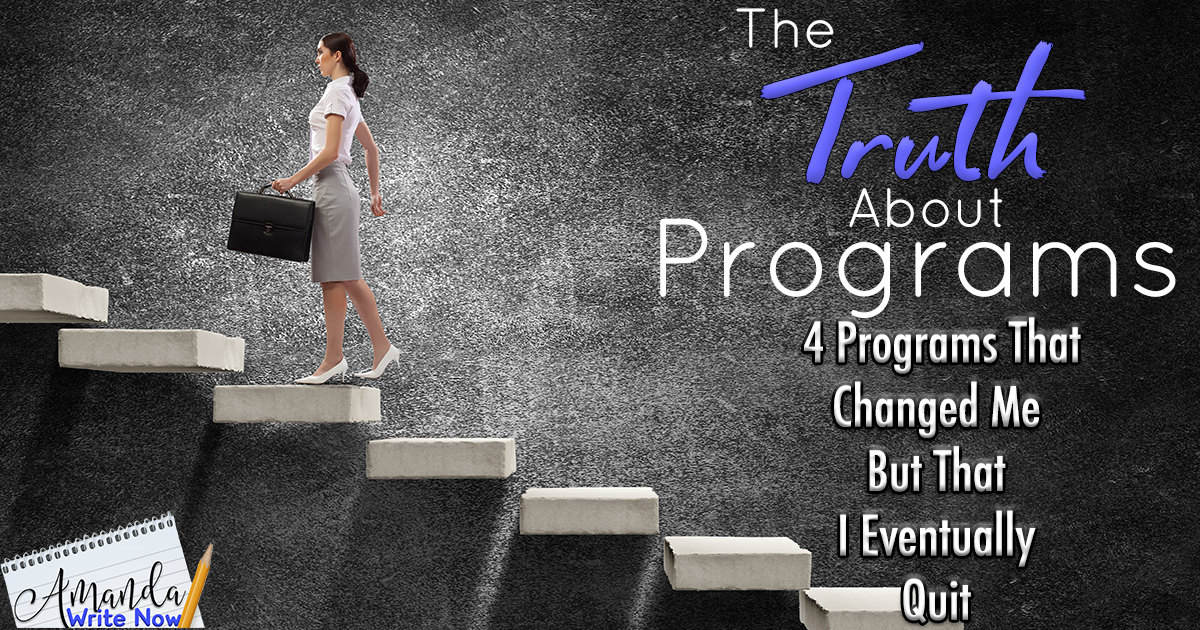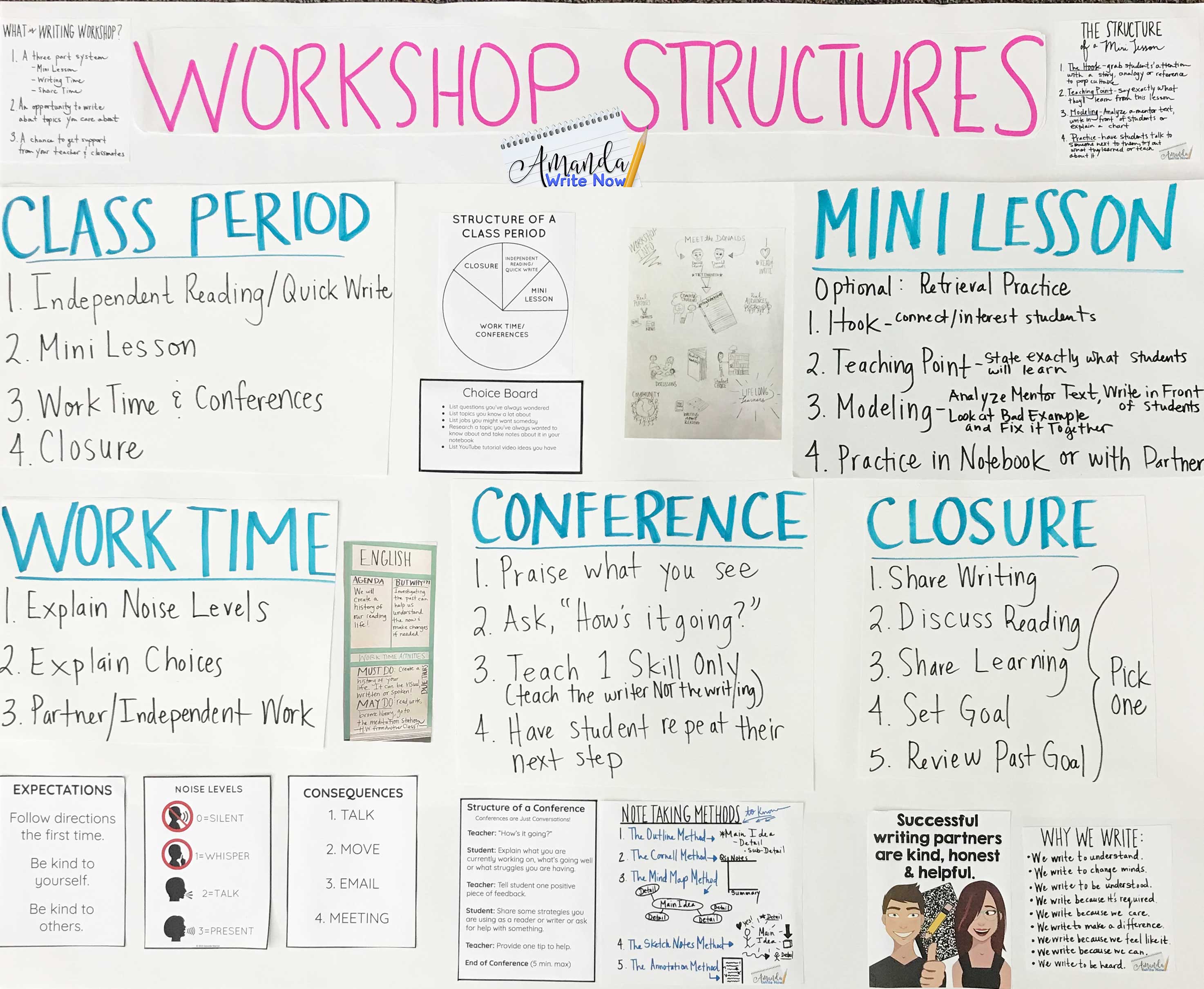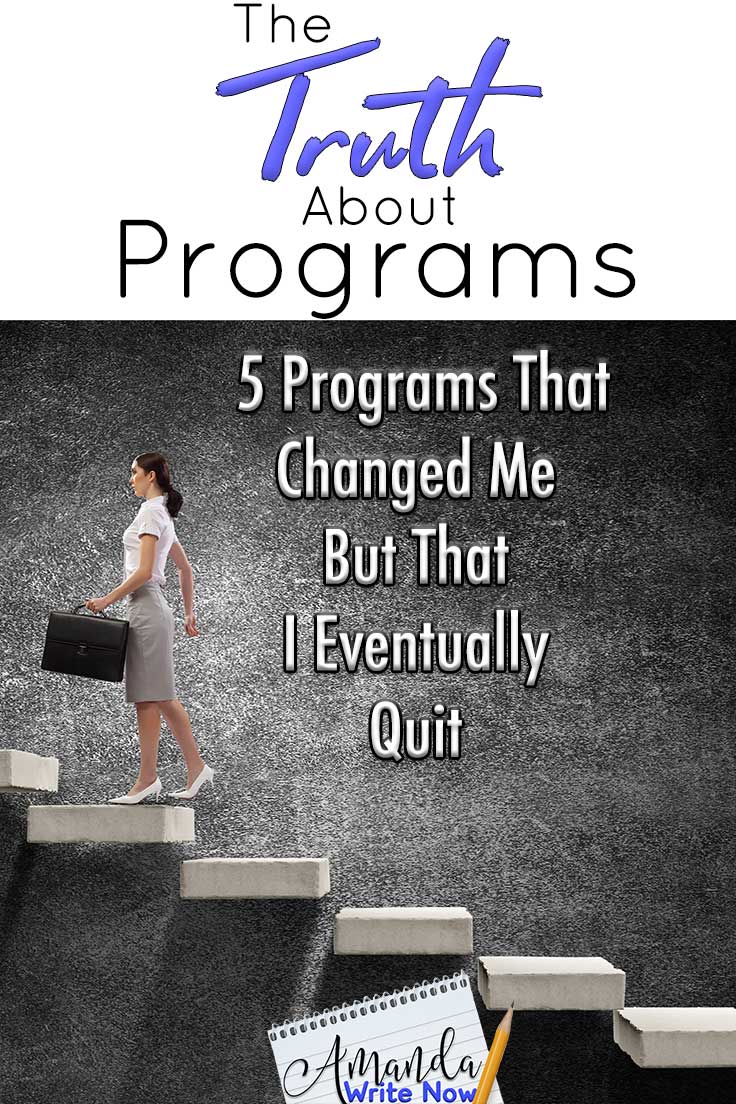
Quitting programs.
I’ve followed and quit so many programs in my life!
Diets, work out routines, parenting guides, teaching curriculum.
Programs are everywhere we turn.
Dictionary.com defines “program” as: a plan of action to accomplish a specified end. In this blog post I want to focus on that term “end”.
All programs must come to an end. Quitting programs is the natural progression of growth.
After using the program for a time, we must let our intuition and creativity guide us!
But sometimes we feel, well, guilty for quitting programs or deviating a bit.
I’m here to tell you, we don’t need to feel that way.
Quitting or deviating from a program is just the natural progression of learning.
My Obsession with Programs
I am enthusiastic about pretty much everything and literally bounce around my classroom and stand on tables.
I also read a ton of non-fiction (and YA books). Often, I’ll tell my husband about a book that I’m reading and I’m just absolutely obsessed with it and I’ll say, “Oh my gosh. This is the best thing in the world and I can’t wait to apply this to my life!”
I’ll read a self-help book and I’ll think it is the bible, and I just need to live my life like this from now on. My husband, calls me on it.
He’ll say, “Amanda, you know you do this. You have this pattern of getting obsessed with a program and following it so religiously.”
As I’ve grown, I’ve realized that he’s right. It’s not healthy to follow a program and never deviate from it! No one is perfect.
It is not good to follow any program to fidelity for years and years because it stunts your growth.
However, programs are beneficial at certain times in our life.
Sometimes it is important to follow a program for a short while, when you’re a beginner, it’s good to have a script, right? It’s great to have something to help you through the learning process.
The purpose of a program is to introduce you to this new way of thinking.
Programs help us grow as teachers, parents and humans, whether you’re following a self-help book, a diet or you’re following a particular curriculum.
But, at some point you have to deviate from the program. You have to pick what works for you, take it and run with it. You have to think, what is it about this program that resonates with me? and keep that part. The rest you can leave it.
Below you’ll learn about the programs I’ve followed to better myself as a parent, a teacher and a person who wants to be more healthy.
Eventually I always ended up deviating because programs are not sustainable. But…growth is. All these programs have helped me grow into the person I am today.
Don’t have time to read this blog post about the natural phenomenon of quitting programs? Watch the video version instead!
*All the links to books are Amazon Affiliate links. This means that if you purchase the book, I will receive a commission.
Program #1
My daughter is five and just started kindergarten. This is such a huge transition to go through and my whole family has had some growing pains for sure. Both my husband and I work full time. It’s hard. I’ve read all of these parenting books. One of the most influential has been a book called Listen. I finished this book so fast and of course…I was obsessed. I love it. It’s a beautifully written book, and the philosophy is so sweet and caring. The authors share five simple tools you can use to make parenting more enjoyable!
One of the five simple tools is “special time”. Special time is limited by a timer and involves spending quality time with your child. You can spend at least five minutes and up to an hour of time with your child where they are your number one focus and attention, and they get to control what you do. They get to be the leader. It’s basically giving your child time to be heard. It’s giving your child time to tell you what to do because they’re spending all day long listening to adults tell them what to do. That’s rough!
We really need to empathize with our students and children when it comes to this.
The theory is that if you spend time connecting with your child they’re more willing to listen.
I believe this idea applies to the classroom too. Your child thinks, “Wow. my mommy’s listening to me, or my teacher’s listening to me.” They want to please. This part of the program really resonates with me.
Another tool from the book is “setting limits”. Parents and teachers need to make sure they are clear about what these limits are.
The third tool is called “stay listening”, where you allow your child to throw a fit and let them cry as much as they want because they need to get that emotion out.
According to the book, telling a child to stop crying and to go to their room and punishing them for crying can actually be detrimental.
These are all philosophies from this book and after finishing it I thought, “Oh my gosh. I have to do everything this book tells me to do, and I have to follow it to a T.”
So I did…for awhile.
My husband said, “Okay, Amanda, okay. You’re getting kind of obsessed with this program.” Then, my daughter started kindergarten and her teacher let us know that she is out of control in class…that she cannot control herself. I was at a loss thinking, “Oh my goodness. What am I’m doing? I don’t know what I’m doing. Someone help me be a parent!”
Her kindergarten teacher recommended this other book (program) called 1-2-3 Magic. It is most definitely magic. If you’re a parent and are struggling with your kid not listening, you should definitely read it. I love this book. I love this book just as much as I love Listen, but they are two programs with very different philosophies and systems.
Program #2
1-2-3 Magic is all about setting very clear limits and discusses the two biggest parenting mistakes that people make: talking too much, because it allows for arguing, and being too emotional.
I am guilty of both of these things in my classroom and as a parent!
According to the authors, parents/teachers have three jobs: stop obnoxious behavior, teach start behavior, and spend quality time with your child.
But what this book really showed me that Listen didn’t show me was I need to be very clear about my limits with my daughter and I need to stop talking so much and be as unemotional as I can when she’s exhibiting obnoxious behavior.
Now I say, “That’s one.” I don’t do it in an emotional way at all. Then if she keeps doing it, I say, “That’s two.” Then when you get to three, you say “take five”. Take five can involve any consequence that the parent sees fit to dole out. As often as possible, the consequence should fit whatever the child/student is doing. But if they’re just whining, then they need five minutes to breathe in a private place.
This philosophy is very clear cut. You need to set limits and you need clear consequences. The Listen program, doesn’t include as much about what the consequences are or how to actually get your child to listen.
You might be wondering if I’ve quit this program yet. 1-2-3 Magic is pretty amazing and to be honest it is the program I’m currently obsessed with. I’m still incorporating all the elements, so this is the one program I haven’t deviated from, yet…
Now, let’s talk about a program I took very seriously for over 30 days to get my health in check.
Program #3
I did Whole30 a few years ago, and it was amazing (and really hard). Whole30 is thirty days of clean eating. You eat the most healthy foods you can. You can’t eat anything that is processed. No alcohol, sugar or flour. It’s insanity. This journal helped me track how was feeling, what I was eating and the progress I was making. I felt so accomplished after the 30 days. But, guess what? I haven’t done it again since, but you know what? There are certain things about Whole30 that have stuck with me.
I took what I wanted from that program and I feel like I’m a healthier person because I don’t put a bunch of sugar in my coffee. I don’t go to Starbucks and stopped drinking soda. Those things are what I took away from doing Whole30.
I don’t think I’ll ever do Whole30 again
Take what you want and run with it!
Program #4
Now let’s talk about The Units of Study by Lucy Calkins and company. The year I discovered Lucy Calkins, I was teaching 3rd grade at a charter school that advocated for the workshop model.
Just like all of the other programs I’ve mentioned so far I was absolutely obsessed. I was so obsessed in fact that I read other grade level units just to see how they all connected!
When I first started I would actually read some of the sentences that are in the Units of Study book word for word.
But, do I follow Lucy Calkins’ Units of Study to fidelity years after discovering the program? No.
Do I do workshop every single day of my teaching life?
Nope.
The part of The Units of Study program that I’ve kept is the structures. The structures of workshop are what make teaching and grading so much simpler! Here’s an awesome poster that can help you better understand the structures I’ve latched onto.

I fill in the structure with what my students need, with my own stories, passions and ideas and what I believe is most engaging and important for my students.
Every single part of your day has a structure. When I teach workshop units, I follow these structures. When I teach my Shakespeare unit, do I follow these structures? No. I just teach Shakespeare and kids are getting up and they’re acting. We’re analyzing Shakespeare, and we’re having fun. We’re watching videos like Shakespeare in the Park. Am I doing workshop? No, I’m not doing workshop.
I do other things in my class besides workshop too!
Wrap Up
We need to pick and choose the parts of the program that work for us. Quitting programs is natural and has to occur eventually for you to grow!
At the end of the day, it’s all about our relationships with our students, family and most importantly…ourselves!
Life is hard enough. We need to do what feels good to us. Stop feeling guilty about not following a program to fidelity or quitting programs.
It’s a natural part of growth!
Speaking of programs…my membership program opens up again September 28th 2019! Register here to attend my training all about the five simple steps you need to take to get started with workshop. During the training I’ll also be discussing what my Workshop Teacher Membership Program entails.





0 Comments